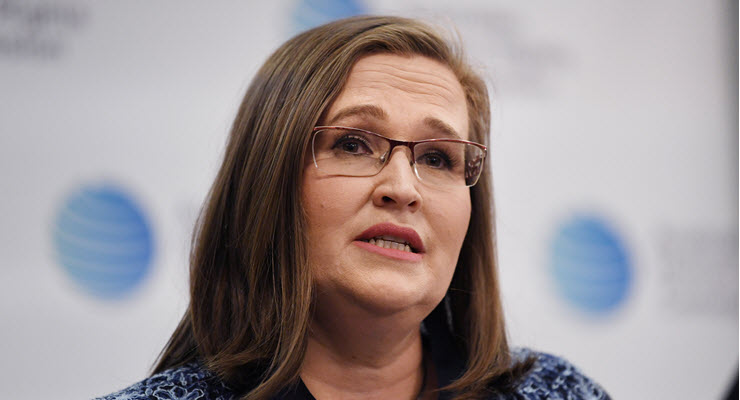
Why is the Morrison government so loath to introduce the recommendations set out by the Australian Human Rights Commission’s report into sexual harassment?
Attorney-General Christian Porter and Foreign Affairs Minister Marise Payne were once full of praise for the Respect@Work report, saying the government was committed to ensuring Australian workplaces are safe and free from sexual harassment.
“No one should have to suffer sexual harassment at work, or in any other part of their lives,” they said.
A year later it’s fair to say nothing could be further from the truth.
The inquiry was strongly supported by the then minister for women, Kelly O’Dwyer. And the recommendations pose a simple fix to many problems women face at work. But Sex Discrimination Commissioner Kate Jenkins told estimates last night she has not had a single meeting with the attorney-general about the report.
Why is the government so afraid of it?
Rights for workers
By calling for more rights for women at work, the Jenkins report seeks more protections for workers in general.
The report puts big business in the gun. At a time when employers are shifting more and more risk on to workers, Jenkins’ report was a massive rebuttal to this — a call to arms for employers to take responsibility for the safety of not only women but of all workers vulnerable to harassment.
Jenkins made it clear that a huge shift was needed — there was too much focus on individuals making a complaint, and employers ticking boxes.
Her report proposed a new regulatory model that would recognise the right of workers to be free from sexual harassment as a human right, a workplace right, and a safety right.
A central part of this would be the addition of a positive duty to protect employees against sexual harassment, meaning employers would have a duty to eliminate sexual harassment in their workplaces, while those who aid or permit someone to sexually harass another person should also be made liable.
She also recommended giving the Australian Human Rights Commission enforcement powers to assess employers’ compliance.
Rights of workers, enforcement powers — pretty much everything the Morrison government opposes when it comes to industrial relations.
Business groups did not miss the subtext. The Ai Group said it welcomed the report but cautioned against changes to the legal framework, saying it would “raise many complex issues and will require careful consideration”.
The Australian Chamber of Commerce and Industry, anticipating an IR battle, told the inquiry ahead of the report that “individuals must be made more accountable for their own behaviour”.
“There needs to be a clear emphasis on individual accountability,” its submission said. “Our employment laws should apportion responsibility appropriately and empower employers to sheet home responsibility to where it should lie, including to individuals taking harassing actions.”
Not our problem
Perhaps the government’s resistance to the report is born of the belief that sexual harassment is a problem that affects only young women, who don’t really vote for the Coalition.
But the report notes that while workers under 30, predominantly women, were among those highest at risk, a 2018 survey of 10,000 Australians found 39% of Australian women and 26% of men had experienced sexual harassment in the previous five years.
The government knows that if it gives an inch on workplace regulation it gives more power to workers to stand up for themselves.
And it has the backing of powerful business leaders that have been hopeful the government will further deregulate workplaces.
So is the government’s aversion to the report a symptom of its hatred of women, or its hatred of workers?
It might be both.








Given the majority of the population are workers rather than bosses, I really don’t get the hatred in politics towards workers in a democratic society. At some point, it is a numbers game. Surely…
Workers don’t donate much to their coffers. And to earn their vote, they will just have businesses and their lobby groups advertise on mainstream media, in return for indoctrination that if businesses need to behave better (ie regulation, fair share of tax etc), then workers will lose their job.
Totally forgetting that sexual harrassment often leads to the harrassed leaving that employment because they feel, and are, unsafe at that place.
I’m curious about two aspects of that. The first is the extent that the manipulation works – ask the average worker and they know businesses are run by crooks and liars. And second, the influence of traditional media is declining, yet at the same time the anti-worker reforms are increasing despite very high profile cases highlighting just how dodgy many businesses are.
The LNP will “support” a report – it is only a word after all and doesn’t have any parliamentary meaning or commitment attached to it.
The hard parts are getting them to read it, comprehend and value the contents and then implement recommendations.
With limited attention spans and the never ending distractions of opportunities for the employment of public funds for personal and political advantage, they only ever remain engaged long enough to complete the first and most compelling stage, the bagging of personal benefits.
Of course it’s both. But in the entirely justified current social anger at the continuing legitimisation of corrosive female inequality it is an excruciating and complex irony this incompetent and corrupt government faces. There will be lots of spin and no action. That’s all you can expect from idiots.
Workers and women.
We know what scomo feels about them, don’t we?
Both.